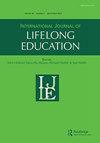促进辅导员的职业发展和工作场所参与度:埃塞俄比亚成人教育项目提供中缺失的一个环节
IF 1.9
Q2 EDUCATION & EDUCATIONAL RESEARCH
引用次数: 0
摘要
成人学习的质量取决于参与成人教育项目提供的个人的专业化程度。成人教育项目的实施主要由辅导员提供支持。增加开发和认可他们贡献的时间和精力有助于激励和延长他们作为项目促进者的工作时间。因此,提高工作场所辅导员的专业素质对确保有效提供成人教育至关重要。考虑到这一前提,本研究旨在审视成人教育促进者的培训、职业发展和工作场所参与如何被纳入成人教育提供。在此过程中,采用了横断面研究设计。采用简单的随机方法选择了200名参与者。通过问卷收集数据,并使用单样本t检验、相关性和卡方分析。研究发现,尽管辅导员的专业发展日益受到重视,但在培训、促进和鼓励辅导员的实践和努力方面仍存在不足。这可能解释了辅导员的高流动率,这反过来又为成人教育计划的提供和管理带来了风险。本文章由计算机程序翻译,如有差异,请以英文原文为准。
Promoting facilitators’ career development and workplace engagement: a missing link from the provision of adult education programs in Ethiopia
ABSTRACT The quality of adult learning depends on the professionalisation of individuals who are involved in the adult education programs provision. The delivery of adult education programs is mainly supported by facilitators. Increasing the amount of time and effort put into developing and acknowledging their contributions can aid in motivating and extending the duration of their work as program facilitators. Hence, promoting the professional profile of facilitators in the workplace is crucial to ensure the effective provision of adult education. Considering this premise, the current study was conducted to scrutinise how adult education facilitators’ training, career development, and workplace engagement have been incorporated into adult education provision. In doing so, a cross-sectional study design was employed. A simple random technique was used to select 200 participants. Data was collected through a questionnaire and analysed using a one-sample t-test, correlation, and chi-square. The study found despite increasing emphasis being placed on facilitators’ professional development, the practice and effort made to train, promote, and encourage them were found to be deficient in certain regards. This may account for a high turnover rate of facilitators which in turn, creates risks for the provision and management of adult education programs.
求助全文
通过发布文献求助,成功后即可免费获取论文全文。
去求助
来源期刊

International Journal of Lifelong Education
EDUCATION & EDUCATIONAL RESEARCH-
CiteScore
3.10
自引率
27.80%
发文量
40
期刊介绍:
The International Journal of Lifelong Education provides a forum for debate on the principles and practice of lifelong, adult, continuing, recurrent and initial education and learning, whether in formal, institutional or informal settings. Common themes include social purpose in lifelong education, and sociological, policy and political studies of lifelong education. The journal recognises that research into lifelong learning needs to focus on the relationships between schooling, later learning, active citizenship and personal fulfilment, as well as the relationship between schooling, employability and economic development.
 求助内容:
求助内容: 应助结果提醒方式:
应助结果提醒方式:


